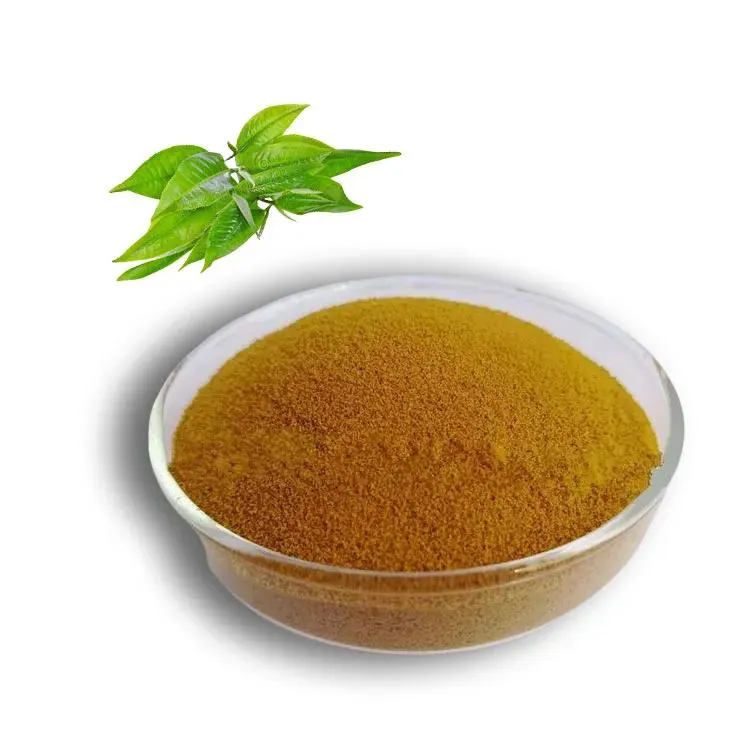- 0086-571-85302990
- sales@greenskybio.com
Green tea extract: Is the extract effective for weight loss?
2024-11-13

Introduction
In the quest for effective weight - loss aids, Green Tea Extract has emerged as a popular contender. For centuries, green tea has been consumed in various cultures, not only for its pleasant taste but also for its purported health benefits. In recent years, the focus on its potential role in weight loss has intensified. But is there scientific substance behind the claims? This article will explore the evidence from different angles to determine whether Green Tea Extract is truly an effective tool for those aiming to shed pounds.

Green Tea Extract composition
Green tea extract is derived from the leaves of the Camellia sinensis plant. It contains a variety of bioactive compounds, with catechins being among the most important in relation to weight loss. The most abundant catechin in green tea is epigallocatechin - 3 - gallate (EGCG). EGCG has antioxidant properties and is thought to play a significant role in the potential weight - loss effects of green tea extract. In addition to catechins, green tea extract also contains caffeine, which is well - known for its stimulant effects on the body.

Metabolism - boosting potential
The role of catechins
One of the proposed mechanisms by which green tea extract may aid in weight loss is through its effect on metabolism. Catechins, especially EGCG, have been shown in some studies to increase energy expenditure. This means that the body may burn more calories at rest. For example, a study on laboratory animals found that EGCG supplementation led to an increase in the activity of certain enzymes involved in fat metabolism. However, it is important to note that animal studies may not always directly translate to human results.
Caffeine's contribution
Caffeine, which is present in green tea extract, is a well - known stimulant that can also boost metabolism. It does this by increasing the release of fatty acids from adipose tissue, which can then be used as a source of energy. In combination with catechins, caffeine may have a synergistic effect on metabolism. A human study observed that participants who consumed green tea extract had a slightly higher metabolic rate compared to those who did not. However, the increase was relatively small, and it is not clear whether this would lead to significant long - term weight loss on its own.

Fat oxidation
How catechins influence fat breakdown
Catechins in green tea extract are believed to enhance fat oxidation. They may do this by activating certain pathways in the body that are involved in breaking down fats. For instance, some research suggests that EGCG can increase the activity of genes related to fat metabolism in muscle cells. This could potentially lead to a greater proportion of fat being burned for energy instead of being stored. However, the overall impact on body fat percentage in humans remains somewhat unclear, as different studies have reported varying results.
Interaction with exercise
There is also evidence to suggest that green tea extract may enhance the effects of exercise on fat oxidation. When combined with regular physical activity, the catechins and caffeine in the extract may help the body to more efficiently use stored fat as fuel. In a study of moderately active individuals, those who consumed green tea extract before exercise showed a greater increase in fat oxidation during the exercise session compared to those who did not consume the extract. This indicates that green tea extract could be a useful adjunct to an exercise - based weight - loss program.
Appetite regulation
Effects on hunger hormones
Another aspect of weight loss is appetite control, and green tea extract may play a role in this area as well. Some studies have investigated its impact on hormones that regulate hunger, such as ghrelin and leptin. Ghrelin is known as the "hunger hormone" as it stimulates appetite, while leptin signals satiety. There is some evidence to suggest that green tea extract may reduce ghrelin levels, which could potentially lead to a decrease in appetite. However, the effects on these hormones are not fully understood, and more research is needed to confirm whether this translates into reduced food intake in the long term.
Psychological factors
In addition to its potential physiological effects on appetite, green tea extract may also have psychological effects that influence eating behavior. For example, the caffeine content may provide a mild energy boost, which could help some individuals to better resist the urge to snack or overeat. However, individual responses to caffeine can vary widely, and some people may experience negative side effects such as jitters or insomnia, which could actually disrupt healthy eating patterns.
Limitations and considerations
Dosage and standardization
One of the challenges in evaluating the effectiveness of green tea extract for weight loss is the lack of standardization in dosages across different products. The amount of catechins and caffeine can vary widely depending on the extraction method and the quality of the source material. This makes it difficult to compare the results of different studies and to determine an optimal dosage for weight loss. In addition, high doses of green tea extract may carry potential risks, such as liver damage in some cases.
Overall diet and lifestyle factors
While green tea extract may have some potential benefits for weight loss, it is important to remember that it is not a magic bullet. A person's overall diet and lifestyle play a crucial role in determining their ability to lose weight. For example, consuming large amounts of high - calorie, processed foods while relying solely on green tea extract for weight loss is unlikely to be effective. Regular exercise, a balanced diet rich in fruits, vegetables, and whole grains, and other healthy lifestyle habits are still essential components of any successful weight - loss plan.
Conclusion
In conclusion, green tea extract shows some promise as an aid in weight loss. There is evidence to suggest that it may boost metabolism, enhance fat oxidation, and potentially regulate appetite. However, the evidence is not conclusive, and there are many factors to consider. The lack of standardization in dosages, potential side effects, and the importance of overall diet and lifestyle all need to be taken into account. While green tea extract may be a useful addition to a comprehensive weight - loss program, it should not be relied upon as the sole method for losing weight. More research is needed to fully understand its long - term effectiveness and safety for weight - loss purposes.
FAQ:
Q1: How does green tea extract boost metabolism?
Green tea extract contains compounds like catechins, especially epigallocatechin gallate (EGCG). These compounds can increase energy expenditure. They may interact with the body's thermogenesis process, which is the production of heat in the body. By enhancing thermogenesis, the body burns more calories at rest, thus boosting the overall metabolism.
Q2: Can green tea extract really increase fat oxidation?
Studies suggest that the catechins in green tea extract can enhance fat oxidation. They seem to work by influencing the enzymes involved in the breakdown of fats. This means that the body is more likely to use stored fat as an energy source. However, the effect may not be extremely significant on its own and may vary from person to person depending on factors such as diet and physical activity levels.
Q3: How does green tea extract affect appetite regulation?
Some research indicates that green tea extract may have an impact on appetite regulation. It might work through hormonal mechanisms. For example, it could influence the levels of hormones like ghrelin (the hunger hormone") and leptin (the "satiety hormone"). However, more research is needed to fully understand this aspect and its practical implications for weight loss.
Q4: Is green tea extract safe for long - term use for weight loss?
When used in moderation, green tea extract is generally considered safe for most people. However, it can have some side effects such as nausea, stomach upset, and potential interactions with certain medications. High - dose or long - term use may also pose risks to liver health in some cases. So, it's important to consult a healthcare provider before using it for an extended period for weight loss purposes.
Q5: How much green tea extract should one take for weight loss?
There is no one - size - fits - all answer. The appropriate dosage can vary depending on factors such as age, gender, overall health, and individual response. Some studies have used doses ranging from 200 - 800 mg of green tea catechins per day. However, it's crucial to start with a low dose and gradually increase it while monitoring for any adverse effects.
Related literature
- "The Role of Green Tea Catechins in Obesity Management"
- "Green Tea Extract and Its Impact on Metabolism: A Comprehensive Review"
- "Appetite - Modulating Effects of Green Tea: Current Understanding and Future Directions"
- ▶ Hesperidin
- ▶ Citrus Bioflavonoids
- ▶ Plant Extract
- ▶ lycopene
- ▶ Diosmin
- ▶ Grape seed extract
- ▶ Sea buckthorn Juice Powder
- ▶ Fruit Juice Powder
- ▶ Hops Extract
- ▶ Artichoke Extract
- ▶ Mushroom extract
- ▶ Astaxanthin
- ▶ Green Tea Extract
- ▶ Curcumin
- ▶ Horse Chestnut Extract
- ▶ Other Product
- ▶ Boswellia Serrata Extract
- ▶ Resveratrol
- ▶ Marigold Extract
- ▶ Grape Leaf Extract
- ▶ New Product
- ▶ Aminolevulinic acid
- ▶ Cranberry Extract
- ▶ Red Yeast Rice
- ▶ Red Wine Extract
-
Cactus Extract
2024-11-13
-
Citrus bioflavonoids
2024-11-13
-
Jujube Extract
2024-11-13
-
Hedyotis Diffusa Extract
2024-11-13
-
Coconut Water Powder
2024-11-13
-
Maitake Mushroom Extract
2024-11-13
-
Apricot Powder
2024-11-13
-
Panax Ginseng Leaf Extract
2024-11-13
-
Dan Shen Root Extract/Salvia Root Extract
2024-11-13
-
Dandelion Leaf Extract
2024-11-13





















